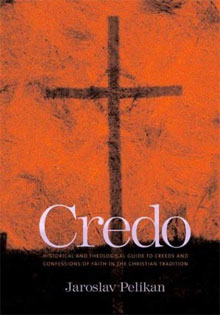Book Notes
 Jaroslav Pelikan, Credo: Historical and Theological Guide to the Creeds and Confessions of Faith in the Christian Tradition (New Haven: Yale University Press, 2003), 609pp.
Jaroslav Pelikan, Credo: Historical and Theological Guide to the Creeds and Confessions of Faith in the Christian Tradition (New Haven: Yale University Press, 2003), 609pp.
Some time ago during a church membership class that I attended, a person asked my pastor a question that was rich with historical and theological implications, not to mention an unwitting commentary on our church: "Why doesn't our church recite the creeds?" Before my pastor could answer, another hand shot up across the room with an equally provocative query: "What are the creeds?" I vowed to myself then and there to tackle a book that I had long wanted to read, Pelikan's massive Credo. Despite its bulk, the tome is "merely" an introductory companion volume to the Creeds and Confessions of Faith in the Christian Tradition, a five-volume, 3500-page set costing $1000 and weighing in at 18 pounds, edited by Pelikan and Valerie Hotchkiss.
Pelikan is the perfect person to write this volume. As the Sterling Professor Emeritus of History at Yale University, and the first John W. Kluge Scholar at the Library of Congress, he is perhaps best known for his magnum opus entitled The Christian Tradition in five volumes. On a personal level, a few years ago, late in his life, he converted from his Lutheran heritage to Eastern Orthodoxy (a conversion he has refused to talk about, as best I can tell), the most "creedal" of all Christian confessions. Finally, although this is a technical, academic text, because of its very subject matter Pelikan does a good job of affirming and explaining both the object content and nuances of Christian creeds and confessions, the "faith which one believes" (fides quae creditur), but also the subjective importance and goal of the "faith with which one believes" (fides qua creditur ). A sort of pastoral acknowledgement of genuine and vibrant personal faith, Christian confessing, is thus never far below the surface of the arcane technicalities that Christians have parsed over the last two thousand years.
So-called "creedal Christianity" faces numerous obstacles today. In addition to the ignorance or maybe apathy evidenced in the questions at my church membership class, to be sure there is also downright antipathy and even hostility towards "dogma." Thus Matthew Tindale (1655–1733) wrote that it was "plain from history that the ambitious, domineering part of the clergy, the imposers of creeds, canons, and constitutions, have proved to be the common plagues of mankind" (p. 499, my emphasis). Pelikan addresses such objections head on. He explains what a creed is and how they have related to Scripture, shows how their authority has been used and abused, tracks the continuity and change of Christian confession across time and place, explores their interaction with politics and culture, and, ultimately, demonstrates how and why creeds and confessions have been necessary, even inescapable, and at times literal godsends against vicious evil (cf. the Barmen Declaration of 1934 and its opposition to Nazi Socialism). This is a wonderfully handsome volume that would make a fine gift to a pastor or church library.


